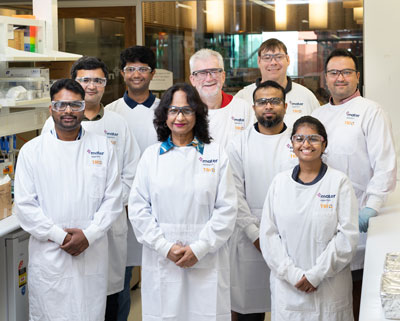Collaborating and translating cancer research for more effective treatments
Professor Kum Kum Khanna has joined Mater Research, with the aim of developing new treatments, or repurposing FDA-approved medicines, for treatment of aggressive forms of breast and ovarian cancer.
With a new base at TRI, she has access to the institute’s core facilities, as well as
Mater patient samples and research collaborators from Mater Research, UQ and QUT.
She will use TRI histology, flow cytometry, metabolomics, proteomics and microscopy
facilities and build on an existing close working relationship with Mater breast and
gynaecological pathologists, oncologists and the clinical trials team.
Being at TRI will also enable closer collaboration with Mater Research Professors John
Hooper, Kristen Radford and Brian Gabrielli; UQ’s Professor Paul Clarke, Associate
Professor Fiona Simpson, Dr Mathew Jones and Dr Arutha Kulasinghe; and QUT’s Dr
Mark Adams, Dr Nathalie Bock and Professor Rik Thompson.
Professor Khanna has been researching cancer development with National Health and
Medical Research Council support for more than 30 years.
“Cancer is essentially uncontrolled cell growth,” she says. “Cancer is also associated with age, because people in the later stages of life have more accumulated DNA damage.
“I wanted to understand how normal cells respond to sources of the DNA damage – both from inside and outside of cells.
“This is an area of critical importance to cancer research, as the mechanisms controlling DNA damage repair are involved in supressing tumours and are believed to mutate at an early stage in the evolution of cancer.”
Several genes involved in the DNA damage repair, including BRCA1 and BRCA2, can become compromised and contribute to breast and ovarian cancer development.
A special area of interest for Professor Khanna has been the ATM gene, known to protect against lymphoma, leukaemia, breast, prostate and pancreatic cancer. Women with a faulty ATM gene have an increased chance of developing breast cancer, as well as a chance of passing it to their children.
“I have been investigating the BRCA1 and ATM genes and found that they talk to each other – and may act in similar ways to cause cancer to develop.
“Moving to TRI and working for Mater Research enables my team to translate what we have learnt to improve treatment for women with cancer caused by DNA damage repair defects – especially where it’s an aggressive form of the disease that has become resistant to treatment.”
Chemotherapy is debilitating for patients and has serious side effects, Professor Khanna says. As a replacement or an additional treatment, immunotherapy is proving successful for some forms of cancer, including melanoma and lung cancer.
But immunotherapy is successful in only about 20 per cent of the time in treating young women with triple-negative breast cancer. Young women with a BRCA1 mutation are at greater risk of the invasive form of the disease that tends to grow and spread quickly. To date, immunotherapy trials have been unsuccessful in advanced ovarian cancers.
Professor Khanna will use patient samples sourced from the Mater Hospital to better understand development of resistance to standard-of-care chemotherapies; the lack of effectiveness of immunotherapy in ovarian cancers to make existing therapies more effective; and to develop novel combinations of treatment strategies for advanced disease.
“Ultimately, the research is about finding new ways to improve sensitivity to chemotherapy and immunotherapy so that we can better treat women with aggressive forms of breast and ovarian cancer.”







